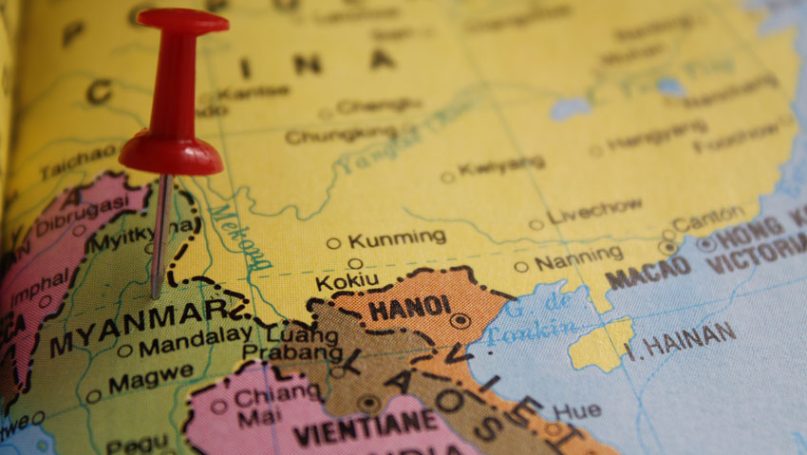
Myanmar’s political history is riddled with violent military coups. On February 1, 2021, Senior General Min Aung Hlaing took control of Myanmar and reverted the budding democracy into a violent authoritarian regime. This is the third time that a military took control of the country in post-independence Burmese history, 59 years after the first coup led by General Ne Win and 32 years after the second ordered by SLORC. As much as the country’s history is rife with brutal military regimes, it is also filled with the people’s revolutions to fight against military rule, the most prominent being the 8888 Uprising, the Saffron Revolution, and currently the Spring Revolution.
The Spring Revolution is distinct from the previous revolutions in that it is the most durable anti-military political movement the country has ever seen. While both the 8888 Uprising and the Saffron Revolution lasted only for a few months, the Spring Revolution continues to gain momentum in 2024, more than three years after the most recent coup d’etat took place. Protracted conflict is still ongoing across the country. As of April 26, 2024, 4,946 civilians have been murdered by the regime, and 26,573 were arrested. Despite the violent crackdown, millions have taken to the streets to protest the military takeover. The ongoing Spring Revolution encompasses different actors and initiatives, including but not limited to the Civil Disobedience Movement (CDM), frontline protests, the National Unity Government (NUG), and the People’s Defence Force (PDF).
To strengthen cooperation across the different branches of the Spring Revolution, pro-democracy activists are increasingly relying on social media. Especially for women, social media has become a powerful space to express their political opinions and organize against the junta. To respond to the growing online resistance, the military government has implemented draconian measures of digital repression that actively persecute civilians who show support for the opposition online. Online violence against pro-democracy activists often translates into offline violence such as arrests and sexual violence. The Burmese military’s digital repression is highly gendered as women activists experience significantly higher rates of gender-based violence and persecution compared to their male counterparts.
Authoritarian actions and responses to online dissent in Myanmar can be sorted into five categories: internet shutdowns, online censorship, surveillance, targeted persecution of online users, and social media manipulation and disinformation. However, women online activists in Myanmar also face specific forms of gender-based violence in addition to these five categories. Some examples of such gender-based violence include doxxing, abusive messages featuring sexist language, leaking intimate videos and images without consent, sexualized disinformation, threats of sexual violence, rape threats, and death threats. Different forms of sexualized repression have the most traumatic physical and psychological effects as these repression tactics subject women online activists and their families to societal shame. An overwhelming majority of gender-based online violence targeted at pro-democracy women is carried out by men.
Women in Myanmar who express their political opinions on social media are targeted for doxxing at a much higher rate than politically active men online. Doxxing is particularly a gendered digital repression tactic in the context of Myanmar since many women activists who were doxxed by pro-military and male-identifying social media personalities, such as Han Nyein Oo and Ba Nyunt, have been arrested by security forces. The arrest comes with the additional danger of more gendered violence against women since mass rape of women and girls is systematically employed by the Burmese military.
The gendered nature of the Burmese military government’s digital repression is worrisome because online violence against women serves as a significant barrier to their meaningful political participation. According to the 2023 Freedom House Freedom on the Net Report, Myanmar has one of the most digitally repressive regimes in the world, second only to China. Enabled by the political support of Russia and China, and equipped with international surveillance technologies, the Burmese regime is committing crimes against humanity targeted at individuals who speak out against the military rule on social media. Women bear the brunt of this targeted digital repression solely due to their gender.
The case of Myanmar highlights how autocrats are leveraging social media as a political tool to not only react to but also proactively deter women’s online activism. Online repression tactics employed by the Burmese military might be appealing to other authoritarian governments for oppressing feminist dissent in their own countries. This somber potential, if realized, can further set back women’s rights in different authoritarian regimes at a highly alarming rate. Therefore, it is not sufficient for the international community to merely condemn gendered digital repression in Myanmar via statements and press releases. International stakeholders need to collaborate with civil society in Myanmar to provide women with robust training in digital security that will enable them to continue fighting for democracy in safer yet more creative and subversive forms of digital activism.
Further Reading on E-International Relations
- Opinion – Myanmar Needs Actions, Not Words
- Opinion – The Gendered Face of Violence and Erasure in Kashmir
- Opinion – Saving Myanmar?
- Opinion – The Politics of Inclusion in Myanmar’s Nationwide Ceasefire Agreement
- Opinion – Identity Politics and COVID-19 in Myanmar’s Rakhine State
- Buddhist Nationalism and Extremism in Myanmar and North America